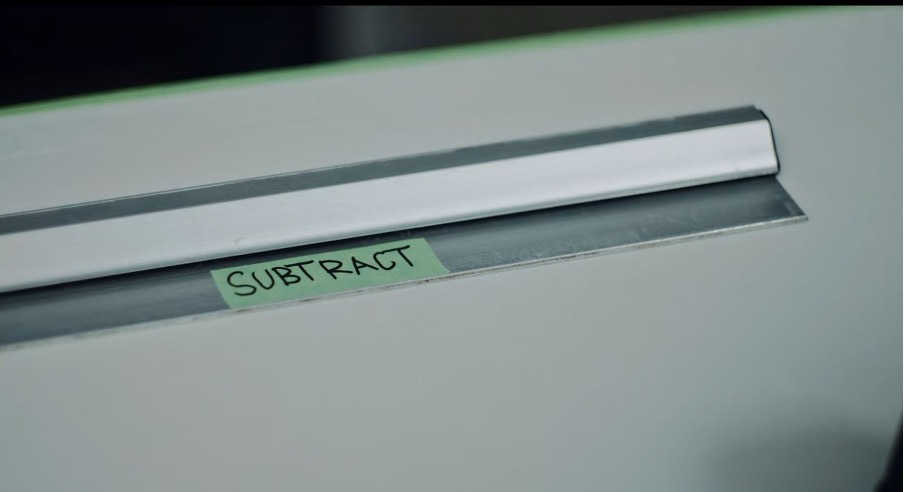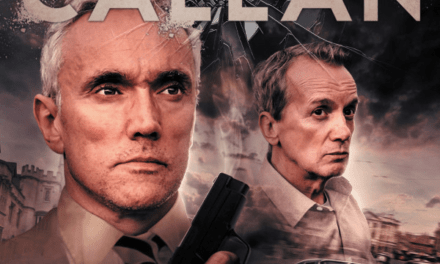
Fig. 1. Still from S3E1, ‘Tomorrow’, The Bear (FX on Hulu, 2022–)
There is nothing new about filler or bottle episodes; when I hear the latter term, I always think of Abed (Danny Pudi) from the NBC sitcom Community complaining about how, in ‘Cooperative Calligraphy’ (S2E8), they (the characters) are becoming stuck in a bottle episode. It is a trope so common it can be used for comedy – and that was 15 years ago. While usually due to restrictions in budget, time or other external matters of production, the constraints placed on the writing of such episodes can lead to a deeper exploration of one or multiple characters and therefore even add to the quality of the series. However, there is a new trend on the rise: initially intriguing, original, well-written, high-concept series on streaming platforms get inflated with overly long episodes, needless additional seasons, stories focusing on non-essential characters, and excessive scenes in which nothing happens. To extend the metaphor of bingeing: what is going on with the bloating of contemporary TV fiction?
In a time where my students struggle to get through the screening of a TV episode in class (let alone a film) without the distraction of their phones or laptops, who still has the attention span or even the time to watch the fourth season of Stranger Things (Netflix, 2016-2025), which mostly consists of episodes of around 78 minutes (or longer) and a final episode of a whopping 142 minutes long? Not even the show itself is pretending to be TV anymore; it seems that the finale of the last season will be shown in film theatres. Did Squid Game (Netflix, 2021-2025) really need a second, let alone a third season? Why do my friends continue watching The Bear (FX on Hulu, 2022-), even though the series ran out of stakes in the third season and I had to stop watching when we had to follow a character going to the supermarket to buy new napkins?
Apologies if I insult dedicated fans, either of the above or the below, and also for the still under-researched rant (fund my research!), but my impression is that the bloating of recent small(-ish) but successful productions could be a trickle-down effect from what is happening to the Disney Marvel franchise. Since Disney acquired Marvel in 2009 and enjoyed tremendous success with The Infinity Saga, ending in Avengers: Endgame in 2019, Marvel had little left to do. Storylines were completed, contracts finished, actors moved on. It then shifted focus to producing series for the Disney+ platform, exploring supporting characters, tying up any loose ends, or further expanding the world. As I understand (credit goes to my partner, who watched most of this so I don’t have to), these shows add little of value to the transmedia world, many actors seem bored, and the quality of writing, production design and CGI is low. She-Hulk: Attorney at Law (2022) answers a question nobody asked: what if the Hulk’s powers were given to a 30-something lawyer? The reviews are mixed (at best). Secret Invasion (2023) stars Samuel L. Jackson as Nick Fury in a spin-off that left many fans with… well, fury. (Not to mention they got in trouble for using AI-generated opening credits.) And then there’s Ironheart (2025), in which a new character follows in the footsteps of Iron Man but mostly steps on his fans’ toes.
For Disney, the most important part is probably that fans are still paying a Disney+ subscription. As Mark Wolf writes, ‘a [transmedia] world is a place to be vicariously entered, an object of exploration and speculation, and refuge from the troubles of the world in which we actually live’.[1] The investment of fans in the Marvel world is high enough to exploit for profit, even if the quality of the new material is bad. As my colleague Melanie Schiller so nicely put it when I barged into her office recently: a collector will not give up collecting, even if the next piece is less desirable. Fans that invest their time and money in a world will collect all of its content. Supposedly, though, franchises can only do this for so long. Disney’s CEO Bob Iger has already blamed Marvel for audience disappointment in their streaming service: in a Variety interview from 2023 he claims that they ‘diluted focus and attention’ with their Disney+ series. Marvel now appears to be shifting from flooding the platform with mini-series to launching longer-form seasons that cost less yet make more money long-term. It is still, of course, a multi-billion dollar franchise, and therefore serves as inspiration.
The additional seasons of Squid Game form a prime example of the new bloating. They even feature an annoying rapper/drug user character (played by rapper T.O.P) who is named Thanos, after the main bad guy of The Infinity Saga, and is there only to superficially generate conflict while adding nothing of substance. In a 2024 Variety interview, creator Hwang Dong-hyuk expresses never having intended to do another season, being exhausted, and awaiting a time ‘without any phone calls from Netflix’. They returned to an already closed narrative, opening it to let the main character take revenge. This was split into two seasons released six months apart – a well-known method to stretch the time viewers spend with the content. Additionally, they launched spin-off reality show Squid Game: The Challenge and other real-life games, costumes, apps, and tie-ins. In the fictional world, Seong Gi-hun or 456 (Lee Jung-jae) plays the murderous game again, trying to defeat the system from within by inciting insurrection. However, there is a new voting system whereby if a majority of players vote to end the game, it duly concludes. As a result, we end up watching many long, dull, predictable voting scenes. There is also an excess of scenes diving too deep into past events or into the motivations and regrets of extraneous characters. The scenes with masked billionaires watching the games fail to offer a critique and are unwatchable due to poor acting and worse dubbing. All this content adds is runtime.
Series that attract an invested audience are getting dragged out with excessive content to keep subscriptions running. For the quality of television series, this is bad news. Television needs constraints, as it is often artistically better when there are (temporal) limits. Succession (HBO, 2018-2023) showed that less is really more: it ended when it needed to. The Bear, as Sarah Lahm wrote on this blog two years ago, started out excellently.[2] In the first episode of the third season, we see a flashback to when Carmy (Jeremy Allen White) worked for a chef in New York who told him to ‘subtract’, because fewer components make for a better result. Ironically, then, the show proceeds to do the exact opposite. In the present time, all is going rather well. Yet, the season digs for more content, adding more and more ingredients and side dishes, until all we are left with is bloatedness.
There comes a time to say goodbye. Once the autistic surgeon in The Good Doctor (CBS, 2017-2024) convinced everyone he was a good doctor, I just let him get on with it. Similarly, I trust the highly competent characters of The Bear to run errands or mop floors without me. When there is nothing left at stake, leave stories to rest.
Josette Wolthuis is a Lecturer in Visual Culture at Radboud University in Nijmegen, the Netherlands. She holds a PhD in Film and Television Studies from the University of Warwick and, since returning to work from maternity leave, is getting back into writing about television – mostly about costume design and fashion, but also other matters of narrative and aesthetics.
Footnotes
[1] Wolf, Mark J.P. ‘Trans-media Worldbuilding: History, Conception, and Construction’, in: Freeman & Rampazzo Gamborato (eds), The Routledge Companion to Transmedia Studies (New York and London: Routledge, 2019), 141.
[2] Lahm, Sarah. ‘“Thoughtful Chaos”: Evaluation and The Bear’s ‘Perfect’ TV Storytelling’, in: CSTonline, 29 September 2023, https://cstonline.net/thoughtful-chaos-evaluation-and-the-bears-perfect-tv-storytelling-by-sarah-lahm/ (accessed: 24 October 2025).



